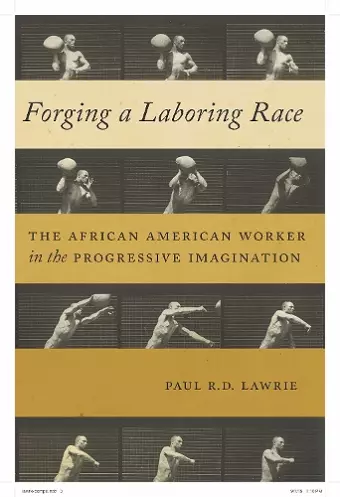Forging a Laboring Race
The African American Worker in the Progressive Imagination
Format:Hardback
Publisher:New York University Press
Published:28th Jul '16
Currently unavailable, and unfortunately no date known when it will be back
This hardback is available in another edition too:
- Paperback£23.99(9781479851409)

Foregrounds the working black body as both a category of analysis and lived experience
“How does it feel to be a problem?” asked W.E.B. DuBois in The Souls of Black Folk. For many thinkers across the color line, the “Negro problem” was inextricably linked to the concurrent “labor problem,” occasioning debates regarding blacks’ role in the nation’s industrial past, present and future. With blacks freed from the seemingly protective embrace of slavery, many felt that the ostensibly primitive Negro was doomed to expire in the face of unbridled industrial progress. Yet efforts to address the so-called “Negro problem” invariably led to questions regarding the relationship between race, industry and labor writ large. In consequence, a collection of thinkers across the natural and social sciences developed a new culture of racial management, linking race and labor to color and the body. Evolutionary theory and industrial management combined to identify certain peoples with certain forms of work and reconfigured the story of races into one of development and decline, efficiency and inefficiency, and the thin line between civilization and savagery.
Forging a Laboring Race charts the history of an idea—race management—building on recent work in African American, labor, and disability history to analyze how ideas of race, work, and the “fit” or “unfit” body informed the political economy of early twentieth-century industrial America.
Forging A Laboring Race is an important and imaginative contribution to the history of race and labor in the Progressive Era. It is also a brisk, powerful, and re-orienting critique of the very notion of 'the black worker' as a discrete category of experience. This notion was produced by myriad think tanks, self-professed social scientists, and busy-bodied state agencies, and it had real consequences for the men and women who arrived in the urban North in the first Great Migration. It persists to this day. * Matthew Pratt Guterl, Brown University *
A painstakingly thorough examination of the black worker as a commodity and a concept within the Progressive imagination. . . . Lawrie boldly demonstrates how a race-based form of industrial capitalism was central to the making of the modern U.S. state during the Progressive Era. * Davarian L. Baldwin, Paul E. Raether Distinguished Professor of American Studies, Trinity College *
The book is a reminder of the need to examine the production, dissemination, and broad acceptance of scientific knowledge in historical context, and does so itself in a compact analysis that will interest scholars of race and ethnicity, progressivism, state formation, and the history of science. * Choice *
A stimulating account of the uses of sciences and the state in defining blackness in the services of war and capitalism, and important reading for any scholar of race, the progressive era, or modernity. * Canadian Journal of History *
Lawrie demonstrates that difference, and most specifically blackness, has been conceived as problematic by Americans. Unfortunately, Americans continue to struggle with the question of whether a diverse group of people can form and maintain a cohesive and strong nation. In our contemporary period, those who say it cannot be done continue to rely on false data; in this matter, Lawries work can help us greet the future as well as the past. * Canada and the United States *
ISBN: 9781479857326
Dimensions: unknown
Weight: 499g
256 pages